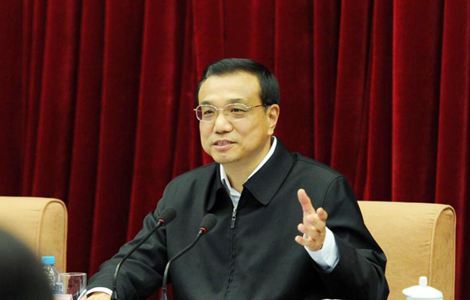China to spend less on railways next year
Updated: 2011-12-24 09:06
By Xin Dingding and Cai Xiao (China Daily)
|
|||||||||||
BEIJING - The railway ministry cut its construction spending for next year but will not stop investing in the rail sector, said a top railway official.
The Ministry of Railways plans to invest 500 billion yuan ($79 billion) on fixed assets next year, including 400 billion yuan for railway construction, Minister of Railways Sheng Guangzu told the annual railway working conference on Friday.
Rail construction spending is down from an expected 469 billion yuan this year and is a sharp drop from 709 billion yuan in 2010.
He said the investment will be used to finish key projects, and some 6,366 kilometers of new lines will be put into service in 2012.
Meanwhile, the money will also be used to kick off construction of major coal transport lines and projects that help complete a trunk railway network and are urgently needed for economic development, he said.
"The rail sector should maintain its development momentum," he said.
Money, however, remains a concern.
The ministry is reportedly 2 trillion yuan in debt. Because money from the government's stimulus plan worth 4 trillion yuan dried up and the tightened monetary policy made the ministry unable to get bank loans, the ministry suffered a shortage of funds in 2011. That led to the halting of more than 10,000 km of high-speed railway projects, including projects due to open this year being postponed to next year.
Ministry statistics show that only 2,022 km of new railways have been finished and opened to traffic in 2011, compared to a planned goal of 5,000 km, less than half of the 5,149 km of high-speed track put into service in 2010.
A recent report said that chickens were being raised at one end of a rail tunnel in Yunnan province, where construction of almost all rail tunnels has been suspended because of the funding shortage.
To answer the concern, Sheng said that efforts will be made to gain support from related government agencies, expand the scale of bonds it issued, and get more bank loans. The ministry will also make good use of all kinds of market tools, and try to attract local government investment and private funds, he said.
Sheng said that the annual Central Economic Working Conference earlier this month, which set economic policy guidelines for the coming year, has decided to maintain a rational investment scale, and guarantee the capital demands of water conservation and railway projects that were already approved to start construction.
"But still, there will be much work to be done to gather enough funds for railway construction, even though the decision has created a good policy environment," he said.
Industrial Bank Chief Economist Lu Zhengwei believed that achieving the goal of raising 500 billion yuan will "not be a problem for the railway ministry", as measures such as bank loans and bond issuance can be important ways of financing.
The Ministry of Finance said in October that companies investing in rail bonds issued between 2011 and 2013 will get a 50-percent tax break on interest earnings.
According to Lu, the move is a sign of the railway ministry's quasi-sovereign status, and the overall condition of the bond market is very good.
According to Chinese Securities Journal, railway construction bonds issued in the first 11 months totaled 100 billion yuan. From 1995 to the end of November this year, the total value of this type of bond issued reached 488.7 billion yuan, and the ministry must pay interest of more than 20 billion yuan every year.
"This may be a pressure but is not heavy, because part of China's national financing will be given as support," Lu added.
Liu Shangxi, deputy chief of the Research Institute for Fiscal Science under the Ministry of Finance, said that private funds are encouraged to invest in railway construction.
According to Liu, funds that raise money from the public should be encouraged to invest in the real economy including railway construction. Strong individual investors can directly invest in it as shareholders.
But Zhao Jian, a professor specializing in rail and air transport at Beijing Jiaotong University, said that it will only further increase the ministry's debt - which it cannot pay off on its own - so the bill may eventually need to be paid by the central government.
Related Stories
Railway investment falls amid debt pressure 2011-11-15 17:47
Railway projects move at slow speed 2011-11-10 07:52
Vice-premier stresses railway safety, service 2011-12-23 22:20
Railways ministry refutes reports on huge fund 2011-11-07 20:36
Hot Topics
HIV/AIDS, Egypt protest, Thanksgiving, climate change, global economic recovery, home prices, high-speed railways, school bus safety, Libya situation, Weekly photos
Editor's Picks

|

|

|

|

|

|







